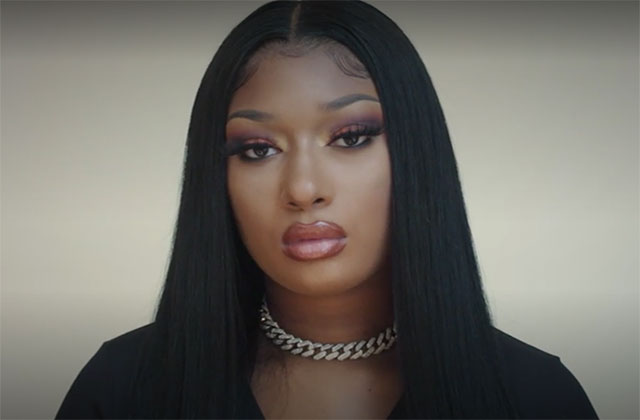Megan Thee Stallion Explains 'Why I Speak Up for Black Women'

In a new video and op-ed published by The New York Times, Megan Thee Stallion asks: “What does it mean to be a woman of color?”
Her heartbreaking answer: a lone warrior.
“She marches for everyone else, riots for everyone else, dies for everyone else,” Megan Thee Stallion says in the powerfully brief video titled “Why I Speak Up for Black Women." It features a montage of various women of color across different age groups, along with audio from Malcolm X’s May 22, 1962 speech on police brutality. “She loves for everyone else, lives for everyone else, but when it comes down to her, it ain’t a [BLEEP] in sight.”
In her op-ed, the rapper addressed her own recent experience as a gun-violence survivor who initially remained silent for fear of retribution and skepticism.
“The way people have publicly questioned and debated whether I played a role in my own violent assault proves that my fears about discussing what happened were, unfortunately, warranted,” she wrote. “After a lot of self-reflection on that incident, I’ve realized that violence against women is not always connected to being in a relationship. Instead, it happens because too many men treat all women as objects, which helps them to justify inflicting abuse against us when we choose to exercise our own free will.”
To that end, Megan also circled back to her October 3 “Saturday Night Live” (SNL) performance, where she admonished Kentucky Attorney General Daniel Cameron for his decision to not prosecute any police officers in the Breonna Taylor case. Evoking the late Rep. John Lewis (D-Ga.) adage's of “good trouble,” the Texas native wrote that criticism doesn’t bother her when she’s defending Black women:
It’s ridiculous that some people think the simple phrase ‘Protect Black Women’ is controversial. We deserve to be protected as human beings. And we are entitled to our anger about a laundry list of mistreatment and neglect that we suffer.
For more must-read quotes from the op-ed, see below:
On Black women stereotypes:
"Many of us begin to put too much value to how we are seen by others. That’s if we are seen at all. The issue is even more intense for Black women, who struggle against stereotypes and are seen as angry or threatening when we try to stand up for ourselves and our sisters. There’s not much room for passionate advocacy if you are a Black woman."
On body-shaming Black women:
"If we dress in fitted clothing, our curves become a topic of conversation not only on social media, but also in the workplace. The fact that Serena Williams, the greatest athlete in any sport ever, had to defend herself for wearing a bodysuit at the 2018 French Open is proof positive of how misguided the obsession with Black women’s bodies is.
"I would know. I’ve received quite a bit of attention for appearance as well as my talent. I choose my own clothing. Let me repeat: I choose what I wear, not because I am trying to appeal to men, but because I am showing pride in my appearance, and a positive body image is central to who I am as a woman and a performer. I value compliments from women far more than from men. But the remarks about how I choose to present myself have often been judgmental and cruel, with many assuming that I’m dressing and performing for the male gaze. When women choose to capitalize on our sexuality, to reclaim our own power, like I have, we are vilified and disrespected."
On the untaught power of Black women:
"Wouldn’t it be nice if Black girls weren’t inundated with negative, sexist comments about Black women? If they were told instead of the many important things that we’ve achieved? It took a major motion picture, 'Hidden Figures,' to introduce the world to the NASA research mathematician Katherine Johnson. I wish I’d learned in school about this story as well as more earthly achievements: that Alice H. Parker filed the patent for the first home furnace, or that Marie Van Brittan Brown created the first home security system. Or that Black women, too often in the shadows of such accomplishments, actually powered the civil rights movement. It’s important to note that six of the Little Rock Nine students whose bravery in 1957 led to school integration were Black girls. And that Rosa Parks showed incredible bravery when she refused to move to the 'colored section.' I wish that every little Black girl was taught that Black Lives Matter was co-founded by Patrisse Cullors, Alicia Garza and Opal Tometi."
Click here to read the complete op-ed and watch the video above.
